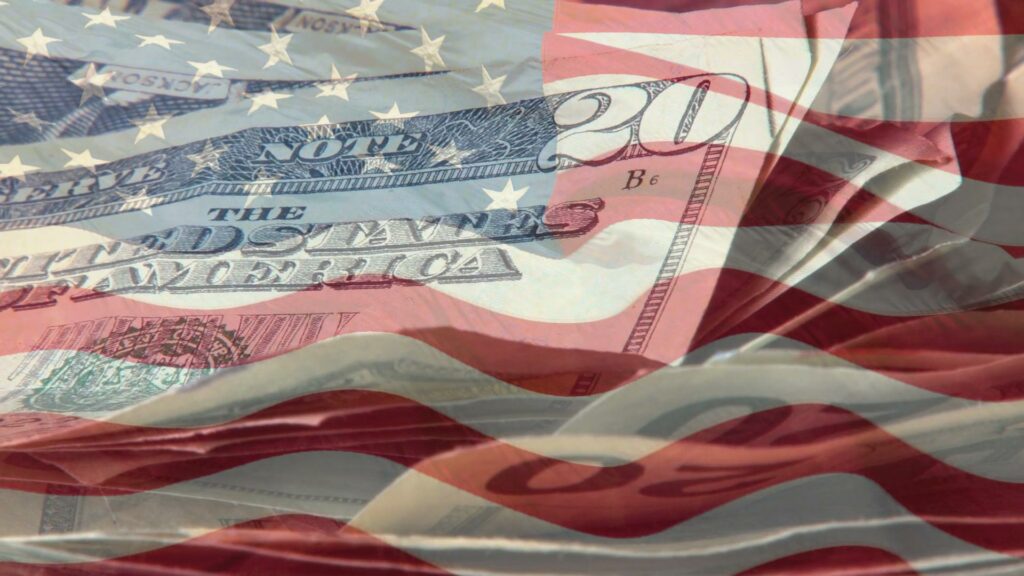This Economic Moment
Continued disjunctures between perceptions and the indicators.

Via Vox comes another piece that notes that the macroeconomic indicators and the public opinion polling are not in synch: Wages are rising. Jobs are plentiful. Nobody’s happy. The key factor continues to be the inflation.
Inflation also feels like a thing happening to people outside of their control. When things go well for people at work — when they get promotions and raises — they often attribute it to their unique circumstances and talents, not macroeconomic conditions.
This strikes me as a plausible theory of the general psychology of most people. If prices go up, this is due to factors outside of my control, but if I get a raise, it is because I worked hard! Or, more to the point, I don’t deserve to have prices on steaks go up, but I most definitely deserve to be paid more.
When it comes to actual behavior, however, people are not acting especially pessimistic about the general economy.
Many Americans are better off financially than they were pre-pandemic, and many of them are acting like it, too. Consumers and businesses have kept spending. New businesses have been created. None of this is to say that all is hunky dory. If you’re trying to buy or sell your house right now, things are far from ideal. Credit card debt is on the rise. I cannot say this enough: Higher prices suck. Still, actions speak louder than words.
“If people were actually pessimistic about the future of the economy, they’d start saving, when in fact they’re spending like crazy,” Wolfers said. “If you look at the behaviors that would reflect the belief that the economy was good or bad, all of those behaviors suggest they’re incredibly optimistic, and they’re roughly as optimistic as you would expect based on things like the unemployment rate.”
This strikes me as a telling indicator that the polling is based more on feelings than objective reality when it comes to the economy. If people really were are bad off as the polling suggests, spending would demonstrate this fact.
And yes, it is certainly the case that individuals can have different experiences than the overall economy.
As the piece, notes, these are odd economic times, especially given the robustness of the job market.
I recommend the whole piece.






While I think there is some truth to the vibes angle, I would again note that averages and aggregate indicators can hide a lot of variability.
And if you look at inflation vs wages, prices have increased for everyone but wages have not increased for everyone. Averaged wage figures mean wages for some have gone way up and decreased or stayed the same for others. Then, we can look at those on fixed incomes who aren’t included in wage statistics and are always on the back side of the inflation wave.
That said, I think things are improving, are as good as one could reasonably expect given the circumstances, and are generally going in the right direction. If that keeps up, it’s not only an objectively good thing, but will also do much to help Biden get reelected.
@Andy:
I worry about crashing home sales. Real Estate drives a lot of the economy. We’ve got a year to election day. OTOH I like that Biden’s numbers are cratering now, a year out. I think he’s at the bottom, ready for an upswing, while Trump is riding high, waiting for a conviction. I like those arcs. But mortgage rates, oy.
@Michael Reynolds:
Mortgages and rents. In my area rents are continuing to rise while housing prices have not yet fallen. If we were moving here today, we simply could not afford it.
Also interesting is figure 1 from this post at Econobrowser:
https://econbrowser.com/archives/2023/11/one-year-ahead-inflation-expectations-2
Notice how huge the discrepancies are between experts and consumer sentiment vs reality when it comes to inflation. Everyone’s predictions have been wrong and continue to be wrong.
@Andy:
Housing is becoming a huge crisis in a lot of the country, and I am very worried that Democrats (or Republicans for that matter) aren’t doing anything to head it off.
I’m worried about the next election, of course, but also just the condition of our cities and the people living in them. (Rural has its own problems)
I’m not sure this essay is really insightful or valid at all.
“Consumers and businesses have kept spending. New businesses have been created.”
New businesses are always created. Spending citations are problematic. Credit card debt is rising – at 20% debt service. Now IRA’s are being tapped. This is not sustainable. Spending to sustain lifestyle is not healthy, and comes with expense: future costs/expenditures.
With a nod to Gery Garcia, who appears to understand this: “If you plant ice, you’re gonna harvest wind.”
And the notion that “inflation is subsiding” is simple minded. Yes, it is. But, variously, estimates range from 4%- 17% the reduction in purchasing power experienced by people in the last couple years – depending on what you primarily spend on. Housing? Education? Health care” Are you fixed income? And so on.
“If people were actually pessimistic about the future of the economy, they’d start saving, when in fact they’re spending like crazy,” Wolfers said.
This is simply false. People try to maintain current lifestyle, even at the expense of the future. Talk about Psych 101.
“If you look at the behaviors that would reflect the belief that the economy was good or bad, all of those behaviors suggest they’re incredibly optimistic, and they’re roughly as optimistic as you would expect based on things like the unemployment rate.”
No. It would suggest the devil be damned, or, the government will bail me out. The unemployment rate citation is particularly stupid. We have a declining workforce base. Look at EMRO. Who is this Wolfers guy?
On balance, the citations and this blog post are rather vapid and vacuous.
Maybe we’re letting ourselves be demogogued. Maybe the economy is not that bad. Maybe drag queens storytelling is not dangerous. Maybe public libraries are not stealing the souls of our children. Etc.
Property values are high? Maybe that’s not a big problem for the 66% of Americans that own homes.
@Slugger: Higher property values mean higher property taxes, which ends up being a significant pressure on older people who are on fixed incomes. This is compounded by global warming, which has reduced the number of available ice flows to leave our elderly populations on.
Also, as people are priced out of areas, it impacts the service economy. As a member of the landed gentry, I want servants to be available as needed. Think of the baristas! They’re like children, except of legal age so it’s not as repulsive when you flirt with them, and they live off tips so they have to pretend that your jokes are funny.
Further, higher mortgage rates mean that if the landed gentry wants to gentrify other land, the amount of money they will get for their current estate will be less (if people can only afford $X/mo, and they are paying the bank more, that’s less for you), and upsizing to a more spacious estate can become cost prohibitive. This cuts the amount of people moving, which cuts choice of housing stock, which raises prices further.
Finally, higher housing prices are strongly causal for higher rates of homelessness, and homeless people are ugly. The landed gentry doesn’t want to see that shit, not in their neighborhoods and not on their commutes and not in front of every grocery store hawking the Homeless Times or whatever they are doing and trying to make eye contact. As our local Fox station likes to remind us, “Seattle is dying!”
High housing prices hurt the hoi polloi more directly than goodly people like us landed gentry, but we still feel the pain. And our delicate skins feel pain more intensely than their calloused hands.
@Gustopher: You make many good points. I do think if housing prices were declining politicians would rabble rouse about the impoverishment of good middle class home owning people. If prices go up, it’s bad; if prices go down, it’s bad. I’m an old guy. I sold my house and captured the run-up in housing prices. We moved into a smaller house in the same zip code. A smaller place is quite reasonable as one ages. My sister arranged moving her in-laws into assisted living by selling their home. High prices definitely hurt some people as you point out but help others.
That would be a thoroughly irrational way to behave if they thought high inflation would return (or continue, if they ignore recent news). Buying as much as you can afford to horde at today’s prices is the sensible thing to do if you expect everything to be 10% more expensive next year.
That’s why I keep tripping over cases of whisky in the living room.
You have to factor in that the Baby Boomers are moving from saving to spending as they move into retirement. That’s reduces the flood of easy money that has been being thrown at speculative investment. It means companies have to replace Boomers who retire. It means selling homes in near-urban areas when prices are high and expanding housing development in the far suburb retirement-friendly areas.
And people who are retiring focus on inflation eating their savings, and the frequent “bright ideas” to tax wealth, i.e, take savings, etc.
@JKB:
I’m not so sure you’re right. I’m 69 and spending less and investing more. I still spend too much, but I’ve cut my costs about 15%, and have become much more disciplined about watching my money, precisely because I can see a possible future of less income. IOW age has made me a better investor and a bit tighter.
@Michael Reynolds:
I find myself much more in agreement with Michael Reynolds than SKB. People are doing things like saving vs spending (which occurs most heavily in the 35-50 range). And although they should be altering the composition of their investment portfolios from equity towards fixed income (as a general rule; not necessarily in the age of inflation) they tend not to be investing in the real sense: new capital for new investments.
With the baby boom bulge moving into a more risk averse mindset (meaning less capital) public policy should adjust accordingly: lower capital gains taxation. I see no such understanding from the left, who simply throw firebombs for votes and seek short term money to support their wasteful spending habits. Republican not far behind, mind you………